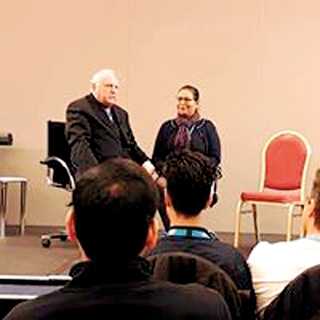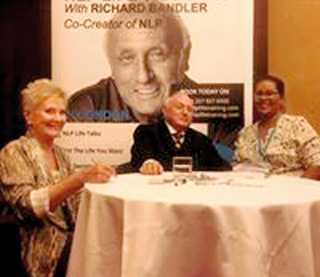Saturday Feb 14, 2026
Saturday Feb 14, 2026
Saturday, 14 November 2020 00:05 - - {{hitsCtrl.values.hits}}

Neuro Linguistic Programming is the practice of re-evaluating a person’s unwanted negative thoughts and emotions into specific positive thinking and achieving those specific goals
By Milani Salpitikorala
I believe in being the change you want to see in the world. I believe anything is possible and achievable. The study of today’s psychology has found out that the research should actually be done on people who have already won at life so as to learn on the methods they use to be successful.
This is the study of Neuro Linguistic Programming and Transformative Coaching. Transformative Coaching includes assisting people to transform from within. To bring about a positive change to oneself by changing ones thinking patterns. It is quite simple really. Just that our default settings have been set to always think and worry about the negatives, to always be over precautious which later results in unnecessary anxieties.
How many people do you know who have gone for continued therapy or take continued anti-depressants for a very long time but no actual change happened? This is because the change is not from within. Rather an external person or thing is trying to bring about change.
This is the beauty of Neuro Linguistic Programming and Transformative Coaching – it doesn’t require continued attention on the client for a long period of time. Ideally 10-12 sessions would assist a client in reaching for that transformation within themselves. Emotional Intelligence is achieved within these few weeks and quick and effective results are inevitable.
How much time does one spend on a regular day, thinking about challenges, stressing, worrying about things that are not under his/her control?
What is Neuro Linguistic Programming?
Neuro Linguistic Programming is the practice of re-evaluating a person’s unwanted negative thoughts and emotions into specific positive thinking and achieving those specific goals.
Neuro – is referred to the nervous system through which experience is received and processed through the five senses (Visual, Auditory, Kinesthetic, Olfactory and Gustatory).
Linguistic – is referred to the language and non-verbal communication systems through which neural representations are coded, ordered and given meaning.
Programming – is the ability to organise our communication and neurological systems to achieve specific desired goals and results.
Neuro Linguistic Programming is an attitude characterised by the sense of curiosity and adventure, and a desire to learn the skills to be able to find out what kinds of communication influences somebody and the kinds of things worth knowing, to look at life as a rare and unprecedented opportunity to learn.
Neuro Linguistic Programming is a methodology based on the overall operational presupposition that all behaviour has a structure, and that structure can be modelled, learned, taught and changed (re-programmed). The way to know what will be useful and effective are the perceptual skills.
Neuro Linguistic Programming has evolved as an innovative technology enabling the practitioner to organise information and perception in ways that allow them to achieve results that were once inconceivable.
 |
 |
 |
| Workshops by Be Your Change Founder Milani Salpitikorala with NLP Co-Founder Dr. Richard Bandler in London in 2019
|
Facing challenges
Challenges in life will always exist. When you think you have finally resolved one, another smacks you right in the face. The thing is, if you keep thinking about your problems all day and worrying about them all day there is a lot of time wasted just thinking about it and being anxious about it. Instead of worrying, you program your thinking into something that you can do. Our brains are amazing machines and is capable of so much. This is why we are the dominant species in the world.
The human brain can easily adapt. Adapt to new learnings. A two-year-old child today can operate a smart phone. We are always evolving and adapting to new things. This is why we need to keep the five sense communication with our nervous system in check and not stagnant.
For example, if someone has just gone into debt and had 100 rupees in his bank account, what help would it make if he sits at home worrying about it, being anxious, having anxiety attacks, headaches, palpitations and crying. Instead, would his situation change if he erases the memory of how he lost that money and picture a plan in his mind and work towards how he can recover it? For example, he could go through job listings, find a job.
It may not seem as easy as it sounds, but perseverance and hard work will always pay off. If it doesn’t then you are probably doing it wrong. Planning and organising is one of the most important factors for a successful life.
“As the world evolves at this rapid rate, we’re all going to have to master new tasks, new situations; our children even more so and their children even more still. We have to become people who adapt mentally and become learning machines. We can’t keep coming up against problems, throwing our hands up in the air and walking away; we can’t just keep talking about the same old problems. The big change made by Sigmund Freud, the founder of psycho-analysis, was the idea that the cure for mental illness, which was called melancholia at the time, was a talking cure (rather than hosing you down with cold water and all the other things that they had tried back then). Right now, we have to move up from the whole idea of mental illness and start to talk about optimising the human brain so that it works maximally and perfectly and adapts to problems. This is what I call ‘thinking on purpose’ and it’s a learnable skill. You may have to learn to think on purpose because we won’t just be solving problems, we will be exploring the edges of the universe – maybe not for you personally, but for those around us. The more of us who think on purpose, the more likely we are to survive as a species” – Dr. Richard Bandler, Co-Creator of NLP.
Being mindful
Thinking on purpose is being also the same as being mindful. Do you brush your teeth to brush your teeth? Or do you think about 10 other things in parallel while brushing your teeth?
Satipatthana is the establishment or arousing of mindfulness as part of the Buddhist practices leading to detachment and liberation. Being in the present moment and thinking on purpose rather than thinking by way of our habits or things that we have got used to as children is mindfulness.
“People cannot see outside of what they believe; they don’t take it as an act of faith that the universe is infinite. Part of being a problem-solver is believing that solutions exist and that they’re not infinitely complex. Most things are, as the 20th century thinker Mosche Feldenkrais described, the elusive obvious. We’re just not looking at them from the right point of view, we’re not simplifying them enough to understand” – Dr. Richard Bandler, Co-Creator of NLP
Every problem has a solution
Every problem has a solution. You just have to be creative enough to find it. There are three solutions to every problem: accept it (knowing that it is in existence), change it (the part of NLP where you reprogram the wiring in your nervous system within your five senses), if you cannot change it then you leave it (the situation is such that the other person is not ready to change yet, in that case you distance yourself from it). Sounds simple? It is.
NLP teaches you easy techniques on how to change problems. Like I said earlier, challenges will keep coming, finding the solution involves removing our emotions from it and changing it.
The easiest way to solve a problem is to stop participating in the problem. Another technique in meditation is to be a silent observer. Watch what you are seeing, hearing, sensing. Just sit, relax and watch. Watch where your mind is wandering off to. Then slowly bring it back.
Likewise, when a problem comes by, it is easier to solve it when you detach yourself from it and look at it from the view of a silent observer. At this point you have removed your emotions from the situation. This gives you more space to ‘think on purpose’ to find the best solution. Simple again!
“In the end, it’s all about time and how you spend it” – Dr. Richard Bandler
Don’t waste time on worrying
Earlier we discussed about wasting time on worrying. For example, if you worry about something and be anxious for 10 minutes a day, it would be 3,650 hours a year and 36,500 hours for 10 years. This is quite a lot of time to be wasting on worrying. It is scientifically proven that this is also not too good for your physical body.
What if this time wasted on worrying would be traded with time where you were productive, time where you did something that brought you money, something that made you feel good about yourself? What if you exercised, learnt something new, worked on an art project, laughed with friends, cuddled your children, played an instrument? Wouldn’t that be incredible?
But one would then ask me, “But I just can’t get that though out of my head.” There you go, you are already saying it. We must just get it out of our heads. NLP and its useful techniques will help you rid that picture and thought from your head and plant new constructive thoughts that would be more helpful to your existence.
How many instances in life have you met someone who said, “I saw a pretty girl one day but my brain kept telling me ‘I’m too scared to talk to her, because I’m sure she will think I’m stupid,’” then that is the problem, the fact that you’re telling yourself that. If you are worried about what other people are thinking, you forget that the reason you have a brain is so you would have your own thoughts, not somebody else’s.
It’s okay for everybody else to think you are wrong. Everybody though Einstein was wrong. It’s normal to go through these phases, because it shouldn’t just be great thinkers that go through this, you should do this every single day.
Be Your Change concentrates on training clients to think on purpose, to be the change themselves and to find the light within. We focus on training the clients’ minds into being creative enough to resolve their own problems.
Every person having fear-based thoughts and negative thoughts is a normal thing as this is what we have been used to as children, but it is now time to re-wire this system and make a change for a better world!
References:
‘Thinking on Purpose’ by Dr. Richard Bandler, Dr. Glenda Bradstock and Owen Fitzpatrick
(The writer is an Attorney-at-Law, Neuro Linguistic Programming Practitioner, Transformative Life Coach and Co-Founder of Be Your Change. She can be reached via [email protected] I www.beyourchange.lk I P:+94 114 848 852 I M: +94 777 388 212)